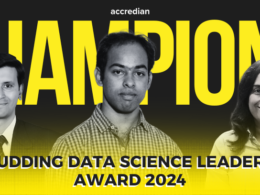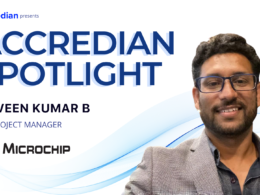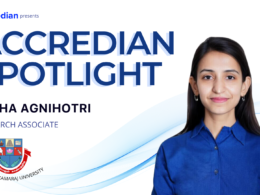Presenting to you the Accredian Spotlight Budding Data Science Leader interview series. This is a series of interviews of budding data science leaders, enrolled with Accredian in different courses. These students coming from diverse backgrounds and even different fields, have rich experience in their own domains. They have interesting views to share with the world, their experience in the industry, what brought them to the field of data science and many other such interesting aspects. These interviews will enrich the readers about the insights, trends and many other related points.
In a recent conversation, we spoke to Deepak Neema who is enrolled in the GCD program at Accredian.
Ankita: Deepak, could you quickly walk me through your experience; what has been your educational background and professional experience?
Deepak: I am a B.E. in Electronics and Telecommunications and graduated in the year 2005. In the same year, I was selected as a Graduate Engineer Trainee in Vodafone Idea (then Hutchison Essar). My primary work in this company was traffic modeling and traffic behavior as the idea was to balance the traffic on the telecom link. The process involved extracting the data from telecom nodes and cleaning, analyzing the numbers etc. In 2007, I switched to Alcatel Lucent, where I joined as a Customer Support Engineer. My job here was to do capacity planning and understanding traffic behaviors.
After this, in 2009, I joined Ericsson as a Senior Support Engineer. Now, here I was handling the support ticket system and also got an opportunity to lead a Problem Management. This problem management was not a regular telecom technology Problem Management, but was mostly data-driven, wherein we used to take data from the products of Ericsson and try to analyze those parameters, which when subjected to some trends, lead to service enablement. For this, I wrote a script and when the program was still under progress, I was promoted as a Technology Specialist.
Currently, I am working as a Solution Architect and in this role, I am delivering new solutions and supporting them. The primary requirement of this role is to provide a solution in a way that it causes minimum investment to my stakeholders within the organization. So for this, I have to understand the data they will be using. If they are using a BigData ecosystem, what kind of IOPS they will be having.
In this role, I also provide support. For this, I have started analyzing the service tickets and the type of solutions given in the current scenario. This was a solution to ticket mapping; what kind of solution receives what kind of ticket and then as a result of this analysis, we could plan what headcount do we need to have.
Ankita: Ok.. So, what I could get is, it is all related to collecting data and then analyzing it in different situations?
Deepak: Yes. This is probably the reason that I have chosen Data Science as my aspiration because most part of my working is with data along with an amalgamation of technology, in terms of telecoms. To be specific, I mostly work with data analysis models. So, I see Data Science as a perfect field to be in.
Ankita: You are a busy professional and you have to juggle between the studies and the job, how do you maintain a balance between both these areas?
Deepak: This balance can be maintained by sheer discipline. You have to set a benchmark for yourself that you need to cut out some time from your leisure and other activities and start giving it to the studies. Every evening, 7:30 pm to 8:00pm is the time between me and my Data Science and I have maintained this schedule.
Ankita: My next question to you would be- what do you think is the goal of Data Science?
Deepak: I see the goal of Data Science as the impact it is going to create on your business and on society. The main goal of Data Science is to help businesses take concrete and informed decisions.
Ankita: What tools and packages have you mastered so far?
Deepak: As I told you, I was mostly into data collection. So when I started initially, Excel came to my rescue and I have worked a lot on it. When I started working with databases, I got some good hands-on experience in SQL. After this, when I joined Accredian, I got to learn working with Python. Talking about packages, Panda packages are the ones which I have mastered.
Ankita: Which is your favorite machine learning algorithm?
Deepak: KNN (k-nearest neighbors) is my pick because it helps you to classify things in a very simple manner.
Ankita: Were there any initial challenges that you faced when you entered the field of Data Science? If yes, how did you overcome them?
Deepak: When speaking of initial challenges, I would like to highlight two categories. We know that when we see a data set from a particular background, we tend to get biased by a particular feature and not give much importance to the other features. So, this creates a biased mindset. This was one of the initial challenges, I tried to overcome by using proper profiling and all the other tools.
The next challenge when entering into the field of Data Science was to showcase your brand and existing skills to your prospective employer in such a manner that he or she feels that you are the perfect candidate for their organization. For instance, I have a pretty good exposure to the telecom technologies and telecom data, but the challenge for me to go into any other field will be that I need to convince them that I will be able to use algorithms in a very lucid manner, as I was using my expertise in data analysis.
Ankita: How has the Data Science evolved over the last few years?
Deepak: A one-word answer would be exponential and drastic change in Data Science, because if you see that companies were generating data a few years ago. There has always been data but it wasn’t handled in a very formal and structured way. For example, we now have companies that are now employing full-time Data Scientists. Initially, what we used to do is that give additional responsibilities to one person.
If I see my experience, I was working as a Telecom Engineer also and I was given an added responsibility to analyze the data. So, at that time, the companies didn’t have much idea about the wonders that the data can do to their business. But in the last five years, I have seen that the companies have started hiring full-time Data Analysts and Data Scientists, because now they are aware that the data actually has the power to change their business. So yes, Data Science has evolved drastically, and exponentially.
Ankita: So, what are the recent trends in Data Science that you’re most excited about?
Deepak: To start with, the number one thing for me is artificial intelligence and most of the time I was with the telecom technologies, in my domain, has been Big Data Hadoop ecosystem. Other hot trends in the field are NLP and computer vision.
Ankita: Any of these trends that you see becoming very big in the future?
Deepak: What I feel is that artificial intelligence could be one of the changing factors in the future. Because as I see from my domain experience, we are on the verge of testing and launching a fifth-generation mobile network.
The idea in this new mobile network is not to make a call or have high-speed data; we have moved way ahead of that. The idea would be to make machine-to-machine communication. Along with this, one of the most useful applications of AI would be in the field of medicine. Therefore, artificial intelligence is one trend that is sure to get famous in the coming years.
Ankita: So like you told me about the applications or the trends related to your own telecom sector, could you just name a few more applications of Data Science and machine learning in your own industry, or from any other industry that you might have noticed over the years?
Deepak: I would like to highlight an example from the field of medicine. For example, Google deep learning algorithm is able to predict cancer to the accuracy of 98%. I’ll now tell you how this is a big thing. Just 11% of the world’s population has access to specialist doctors. Now, if this intelligence can be provided by virtue of Data Science and machine learning, imagine, a community in Africa can have access to these medical facilities and diagnostics.
For example, people in Africa cannot travel to other countries like India to get diagnostics. But he can provide us reports through an algorithm that is able to predict whether he can have cancer or not, and he can be prepared right now. So, I feel one application of Data Science is cancer detection or detecting rare diseases.
Ankita: I also read about it. Many of the evolutions and developments have been into the medicine and the health sector.
Deepak: That has to be, because you do not have lots of specialists and radiologists to treat the 9 billion world population. And, if you see the given lifestyle and the food quality we are having, it will better to have increased access to specialized medical treatment.
Ankita: Yes. This is precisely the reason for increased work and innovations in the health sector. As a next question, I would want you to name any data science and AI influencers that you follow and the blogs that you read.
Deepak: Andrew NG is the one I follow and the other name I would take is that of Dr. Kirk Borne. I also regularly read blogs on medium. You need to follow the influencers and read the blog posts regularly, in order to stay updated about the latest trends in the industry.
Ankita: At Accredian, students are encouraged to maintain high-quality GitHub profiles. Have you also built a GitHub profile? How do you think this will help you? Deepak: After having the Data Science Career LaunchPad sessions at Accredian, I could map the term of visualization even more appropriately. There’s not only visualization of data; it’s about visualization of yourself too, how the industry is going to see you and this is via your LinkedIn and GitHub. So, I have created my LinkedIn profile and posted around three projects in my GitHub profile.
Ankita: So, you mentioned Career LaunchPad. After attending the Data Science Career LaunchPad sessions, how did you improve your resume?
Deepak: Yes, of course. In fact, initially, before joining the course at Accredian, my resume was of 5-6 pages. It was more of a subjective resume and I wasn’t sure what was the correct way to present myself as a prospective employee to an employer. Now, my resume has made a transition from being complete subjective to a result-driven one. And, by reading just one line from my new resume, you will come to know what I have achieved and in which organization. Ankita: My next question to you is- Accredian’s mission is to groom Data Leaders of tomorrow; what do you understand by Data Leaders? And how are they different from Data Scientists?
Deepak: If you see in the industry, even the people who are hiring, say that they are looking for a Data Leader but they actually are looking for a Data Scientist. I personally feel that these two are different positions within an organization. If I speak of a Data Leader, he’s someone who should be leading a team of Data Scientists; who should be providing a vision that this is what we need to do.
Data scientists should formulate a strategy and then do the things. So, this was on the theoretical part. If we talk about the hierarchical part, in an organization, Data Leader would be the one to whom the Data Scientist would be reporting. Data Leaders along with the Data Scientists will figure out the steps-resources, paths, etc. needed to achieve the business objectives.
Ankita: What will be your advice to anyone who wants to start a career in Data Science and who is actually a fresher in this field?
Deepak: The answer completely depends on what kind of work experience the person is holding. For the people having experience in the range of 5-7 years, the advice would be not to directly target the position of Data Scientist; instead, get more and more work done at the machine learning level.
Try to analyze and implement more and more algorithms. When this person will have an experience of 10-12 years, he or she will understand what kind of people should I recruit or what kind of team should I have or what kind of people should I have to attain some particular business objective. In a nutshell, the advice to be given, completely depends upon the experience of the person. If the person has more than 18 years of experience, I would suggest him to go directly into programming and suggest him or her to understand the current trends, identify the business and understand what problem needs to be solved and then talk to the Data Scientists of the team and understand what actions need to be taken.
Ankita: This brings me to the end of the interview. Just one last thing- If you would like to share anything about your journey at Accredian so far, any feedback or anything else. Deepak: I would just like to say that I am impressed how Accredian is working hard towards grooming professionals in the field of Data Science. Nothing else apart from this.
Ankita: Thank you for such kind words, Deepak and thanks a lot for your time. All the best.
Deepak: Thanks a lot, Ankita. Bye!!





